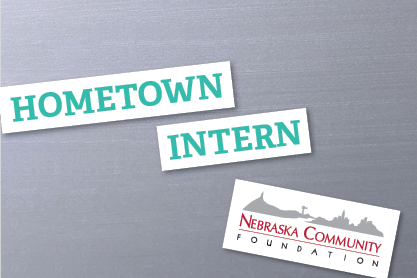
By Miah Hoppens, Hometown Intern
Originally published by Keith County News
In 2021, the Nebraska Community Foundation (NCF) collaborated with the Center of Public Affairs Research at the University of Nebraska at Omaha to release the results of its Nebraska Youth Survey. As a follow-up on a similar piece conducted in 2020, the goal of the research was to understand “the perceptions and perspectives of Nebraska’s next generation” through the responses of over 1,000 students, grades 7–12, from 17 rural Nebraska communities.
Overall, Nebraskan communities should take immense pride in the results. 64% of respondents stated their ideal community would be small, just like their hometown; 91% claimed to feel safe from violence or theft in their home communities; and 78% feel connected to their hometown through family ties, school, or volunteerism.
Through a cursory examination of these statistics alone, one might believe the future of rural Nebraska will be secured by a youthful generation that is excited to live and work in their hometowns. However, as the saying goes, “Figures don’t lie, but liars do figure.” As uncomfortable as it may be to admit, the Nebraska “brain drain”—the yearly exodus of almost 2,000 college-educated adults from the state, according to the University of Nebraska at Omaha—is undeniable. At the local level, the city of Ogallala experienced a decline of over 1,000 individuals since the 1980s.
Data collection efforts such as the NCF Youth Survey affirm the importance of “small town values”: safety, low cost of living, and raising one’s family in a quality environment. However, for the sake of preserving these small town values by passing them on to posterity, Nebraska must put the plug in the brain drain.
To accomplish this, rural Nebraskans should first consider the causes of brain drain. The NCF Youth Survey demonstrated that over one third of Nebraska youth are either “somewhat unlikely” or “extremely unlikely” to return to their home communities following high school graduation. Why? 53% reported job or business opportunities located elsewhere as the main reason why they would not return home.
59% of respondents believed Agriculture and Natural Resources provided the best employment opportunities in their area compared to 3% who desired to pursue that career pathway. Brooke Bode, an incoming sophomore at the University of Nebraska-Lincoln and Hershey High School alumni said, “When I first went to college, I thought I would never work in agriculture again. I thought I would move to Orlando or LA to work for Disney.” Chelsea Luthy, the CEO of a nutrition bar company based in Valentine, Nebraska, had similar experiences. “Sometimes it seemed like the only kids who wanted to come back home and work were farmers and ranchers.”
Of course, agriculture is only one industry in a state with a robust economy including service, manufacturing, finance, and healthcare occupations. Additionally, the rise of the virtual office and the “work from home” movement will also shake up the labor trends. In fact, a 2022 analysis conducted by the Economic Innovation Group suggested that remote working has been driving urban population loss as residents migrate permanently to rural locations.
It isn’t just individuals that are moving—corporations are on the road as well. Austin Truex, a recent University of Nebraska-Kearney graduate and a second-year intern for the Norfolk Area Foundation Fund stated, “Rural Nebraska is on the rise. Post-pandemic, corporations are moving to rural America because that is where they can access their resources, and local businesses are looking for top-notch talent to stay competitive with big name brands as well.”
And it isn’t just corporate workers that are in demand. According to the Nebraska state government, professional occupations such as registered nurses, accountants and auditors, software developers, and educators are all considered “H3” occupations: high wage, high demand, and high skill.
Finally, it would be remiss to ignore the well-established spirit of entrepreneurship in small-town Nebraska. Bode, after a year away at the University, realized the personal importance of small town values and the spirit of giving back to her home community. Currently the founder of Cattle Kettle, an agricultural technology startup, Bode stated, “I’d like to headquarter Cattle Kettle in a small town. A goal for my company is making sure the value of giving back is strongly ingrained in the culture from day one. That’s another thing about small towns . . . you see people just give back a lot.
Luthy stated of her own experiences as a fledgling business-owner, “I really think you can be a self made person in rural Nebraska more so than in other places. You don’t have a better opportunity to create something than in rural Nebraska.” Area business owner Balie Waldhelm of B’s Keys piano studio shares the sentiment. “You have to make your own luck and create your own opportunity.”
Clearly, the grit and tenacity that made this state great endures in the younger generations.
Overall, the perception that one wouldn’t be able to find a successful, rewarding career in rural Nebraska is a misunderstanding at best and a harmful stereotype at worst. The next piece to address, then, is how do rural communities convince their youth to come back?
Truex shared his own experiences as an intern for a local museum in Norfolk and the developer of a job shadowing program. “I think there are a couple of different approaches [to convincing youth to move back to work]. One aspect is to engage the youth. People aren’t going to come back if they feel they aren’t a part of something.” Truex suggested engaging youth in community initiatives, volunteerism, and job mentoring opportunities. “Engage them with the businesses, the nonprofits where they feel they are doing good.. Participation with those subgroups is how you are going to get people to stay.”
Truex, Luthy, and Waldhelm all agree that encouraging young people to come back extends beyond a simple participation award. In fact, the best way to convince the youth to come back, they agree, is to invite them to do so.
Truex credited his hometown return to the local museum he volunteered for in high school. “That’s one of the first things that brought me back from college, they hired me as a summer intern. I really think that’s one of the biggest reasons why I am still engaged and still involved here. The drive is still there, but I was fortunate enough to be connected and involved.”
Area resident Easton Tuttle, a System Admin Technician at Adams Bank and Trust, stated he never believed that his hometown wouldn’t provide him adequate job opportunities. Like Truex, Tuttle participated in a local internship (in his case with a software company), an experience that gave him “faith that job opportunities in my personally desired field would be available if I were to come back.”
For area business owners who desire to see a stop to the brain drain, here is the call to action: reach out to youth by providing job shadowing or mentoring experiences that allow these young people to experience a new range of skill sets and test what type of careers they might be interested in. In other words, meaningful engagement and purposeful relationship building.
Tuttle offered advice specifically to young people on the fence about moving back to their hometowns for work: “There is often opportunity anywhere, but it just may not appear so on the surface. Reach out to companies that you believe you can offer value to, and you may be surprised by the connections that come from being proactive.”
All in all, the plug for the brain drain looks like this: encouraging and providing a platform for rural youth to dig deep, dream big, and give back.



